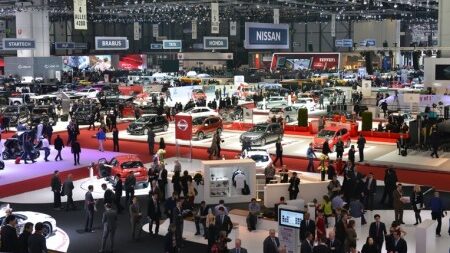The news at the tail end of 2014 that Volvo will cut its attendance at motor shows this year to just three once again raises questions over the value of global motor shows.
Volvo has chosen Detroit, Geneva and the rotating Shanghai-Beijing shows and says it will refocus marketing resources on an annual product day. It is also dropping much of its event sponsorship.
It’s interesting that they have crossed Paris off the list since it has been the world’s best-attended show for some years, attracting more than 1.2m visitors.
In the wake of the 2008 financial crash, several manufacturers cut attendance at car shows. Detroit was a pale imitation of the glitzy show it had become while no foreign carmakers turned up for Tokyo.
Estimates vary but it carmakers can easily spend close to £4million on a single top tier show such as Paris or Frankfurt. Can you measure accurately the return on that investment?
Probably not. So are they worth it?
Our esteemed editor Robin Roberts asked me to indulge in a spot of crystal ball gazing and try to imagine what motor shows will look like in 2045.
We are already seeing changes with the Las Vegas consumer electronics show (or International CES to be pedantically correct) attracting more carmakers each year. Ford started it and now Audi, BMW and others join a host of suppliers (39 at this year’s show) to showcase their technology. It’s a fertile ground for good car news stories and will cost far less than a traditional show.
As we move towards self-driving cars and away from the internal combustion engine as the main power source, much of the glamour associated with cars is also vanishing so the motor show mould of music, lights and attractive models (human, normally female, not metal ones) needs to be broken.

What will replace it? As a journalist, attending one show such as Geneva and being able to interview seven or eight key executives over the course of a couple of days is fantastically time and cost-effective. Having to go to 20 or so different product days if everyone follows Volvo’s lead would be a logistical nightmare let alone a poor use of time.
The internet and the globalisation of the industry have robbed shows of their historical significance as the place to unveil new product. Long gone are the days when we would get pictures and briefings under strict embargo with dire warnings about what would happen to you (and probably your pets, children and other loved ones) if you dare break that embargo.
The modern motor show remains a great place for networking, industry forums and the great and the good to compare notes. It’s also a good chance to check on what your rivals are doing.
For those reasons I think that the key shows, identified by Volvo but with the addition of Paris every other year will remain but become smaller to reduce costs and more diversified as technology showcases exploring mobility in a wider context (perhaps not trams, trains and aircraft but examining how people get from A to B as easily and safely as possible).
By 2045, most of the world’s population will be living in megacities, so these traditional shows will be supplemented by on-going national shows – such as the new Taiwan event which also embraced technology and electronics – or forums examining local needs with a small physical footprint but a huge internet following.
This year’s Geneva motor show will be Tony’s 110th international show in his career which has taken him to events in North and South America, Europe including Russia, Asia, Africa and in total 59 countries. His first was the Earls Court motor show, London in 1979 when he travelled in style in an Austin Princess kindly lent to him by Pam Wearing.

